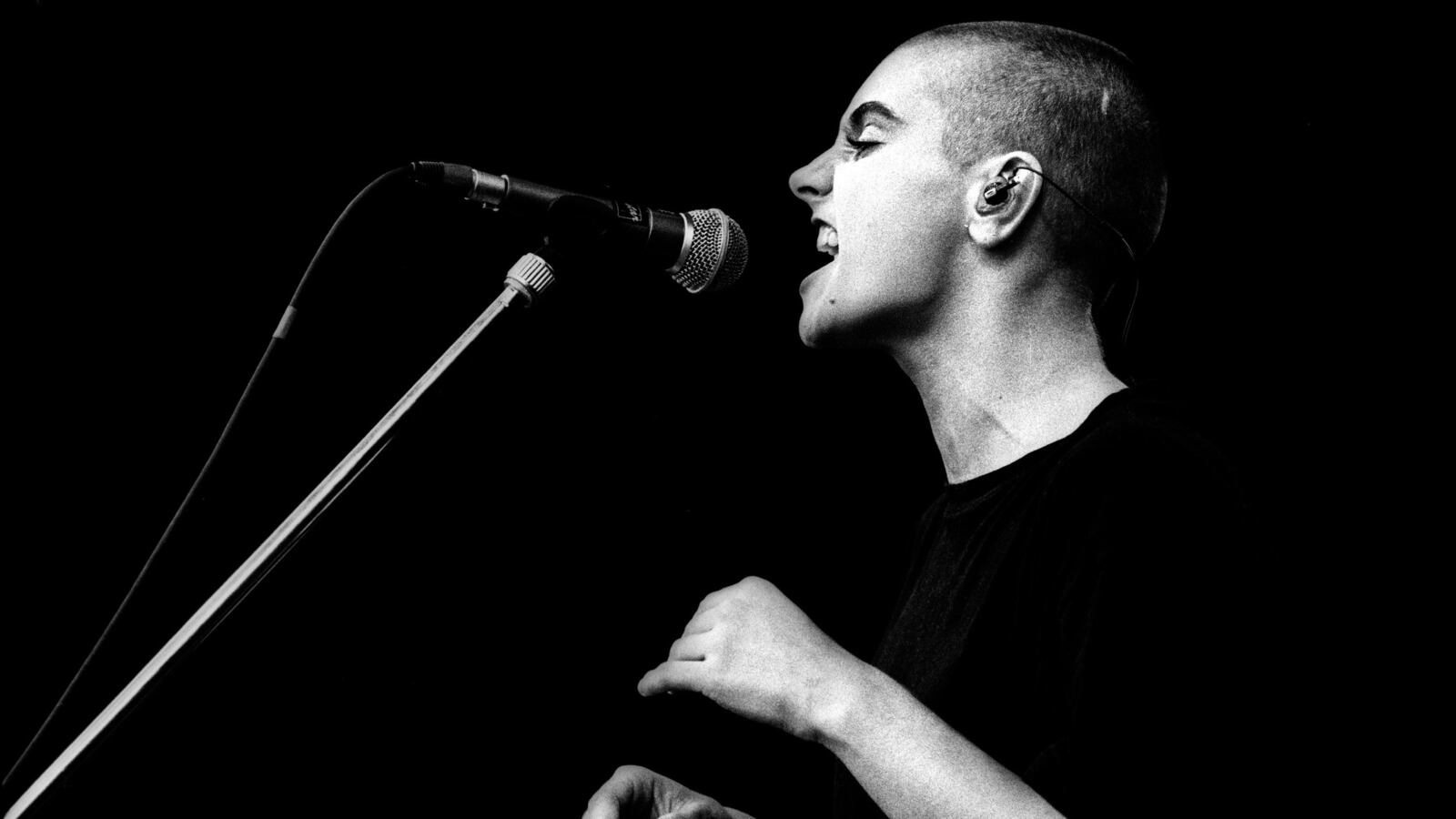Sinéad had just flown in from London and was exhausted. I had just flown in from covering the war in El Salvador and was shattered. What we both needed was a good night’s sleep, instead we were having lunch at some trendy, yuppie restaurant called “America” on 18th Street with my agent, Susan Lee Cohen, who was delighted to meet Sinéad.
Susan was the only happy one at our table, as both Sinéad and I were ready to collapse. We both ordered fluffernutters and barely had the strength to get them up to our mouths, but Susan was beaming as the yuppies from the surrounding tables stared at Sinéad’s bald head, as she wasn’t yet that well known in America. Her first album, “The Lion and The Cobra,” had only been released the year before and Sinéad was just gathering the attention she deserved.
I met Sinéad while during an interview with her for a Spin magazine cover story, and before I met her, I was marveling at all the beautiful receptionists inside Sinéad’s record company office—and then she trudged in wearing combat boots and an Elmer Fudd cap with the flaps down over her ears, and she took off the cap and I saw the most beautiful girl I’d ever seen.
Her bald head seemed to emphasize her stunning face and she kept asking me throughout the interview what I was staring at—and all I could say was, “You!”
After the interview Sinéad invited me to hang out with her and we talked about the Catholic Church in Ireland, the Pope, a Spiritualist Church she was a member of, and the United States. Sinéad was smart, extremely articulate, funny, and the most gorgeous creature I’d ever seen.

Sinead O'Connor on stage at the Olympic Ballroom in 1988.
Independent Newspapers Ireland/NLI Collecton/Hutton Archive/Getty ImagesI thought Sinéad was extremely normal, especially compared to my other friends; Joey and Dee Dee Ramone, and Nancy Spungen and Sable Starr, to name a few.
Since I’d just come from covering the war in Northern Ireland for the past month, that was also a large part of conversation, but I had to catch a flight back to New York in the morning to make my deadline, and we agreed to continue our conversation over the phone.
She was the first person I called when I got back home, and Sinéad was upset that she was scheduled to do a live CBS or NBC interview in the States the next morning, and she was furious that the powers that be insisted she take a car to the interview instead of the subway that she preferred. There was an innocence about her, as well as a very strong will and bravery she possessed that the world would soon come to know—and condemn, even though she was usually correct. Sinéad’s big problem was that she thought people were smarter than they were.
I had to leave New York almost immediately to cover the war in El Salvador on returning home, since I hated writing about the lame bands Spin Magazine was covering during the late 1980’s, ignoring my friends in bands like the Ramones, Blondie, Television, Patti Smith, the Talking Heads, etc., that emerged from my favorite hangout, CBGB’s.
So I’d take any assignment as long as it didn’t have to do with music; wars, UFOs, or crack cocaine that was then reaching epidemic proportions. Anything but music.
When I returned after six weeks in El Salvador, Sinéad flew over from London and stayed at my studio apartment on St. Marks Place and I fell in love with her, and Sinéad fell in love with New York City.
The day Sinéad flew over was when we had our lunch with my agent, Susan Lee Cohen, who remembered the restaurant “America” as being this cavernous up-scale cafeteria with murals of the Statue of Liberty and a bald eagle on the walls, and that Sinéad was wearing her son, Jake’s tiny sweatshirt wrapped around her waist, and that neither Sinéad, nor I, touched our food.
What I didn’t know at the restaurant, and Sinéad only told me when we got home to my apartment on St. Marks Place, was that when she left the table to go to the ladies’ room, John-John Kennedy handed her a piece of paper and pencil and asked for her phone number. The arrogance of John-John earned the wrath of Sinéad, and she broke his pencil and told him to “Fuck off!”
I was flattered that Sinéad picked me over Kennedy, knowing that every girl in Manhattan would’ve given John-John her left ankle tattoo in favor of a date with him.
Such is the power of “guppy love,” as my agent told me we reminded her of.
I’d make bubble-baths for Sinéad in my tiny apartment, and when the tub filled up with bubbles and she climbed in, I’d scoop the soap suds up in my hand and start sculpting different hair styles on top of her bald head.
“What are you doing?” she’d ask, and I’d say, “Seeing what you’d look like with hair….”
“You don’t like the way I look?” she pouted.
“I love the way you look!” I answered.
“Then why are you doing that?”
“Because I was wondering if hair would detract from your natural beauty...”
“Well?” she asked.
“I don’t think anything could,” I said, “But I like you better without it! Your face is perfect!”
Sinéad smiled that smile that could melt an iceberg and we continued our affair until Spin came out with the cover story a few months later.

Sinead O'Connor, at the American Hotel, Amsterdam, Nertherlands on November 10th 1987.
Rob Verhorst/RedfernsI knew our affair wouldn’t last and enjoyed it until it came to an end, but we remained friends even when the “troubles” started during America’s first Gulf War when Sinéad refused to let some New Jersey patriots play the National Anthem at some outdoor stadium before her performance. I stood up for her in the press and said, “What band or singer wants to listen to the National Anthem before they go onstage? When was the last time you heard someone sing the Star-Spangled Banner before a rock & roll show? It’s a ludicrous idea!”
Instead, Sinéad became a late-night comedian’s joke and Frank Sinatra threatened to kick her ass. She was misrepresented in the mainstream press as anti-American, when she just didn’t want to be told how to do her act. The second affront she committed was worse, far worse, and completely unnecessary—tearing up a photo of the Pope on Saturday Night Live. Why someone in Sinéad’s entourage did not explain to her that the Pope in America was thought of as just a nice old guy, not taken too seriously, instead of the fascist dictator he was in Ireland, is a mystery to me.
Friends would ask me about her problem with the Pope and I’d try to explain that the Pope meant something completely different in Ireland, just ask the surviving members of “The Magdalene Girls,” who were Ireland’s deepest shame—unmarried women who were raped by priests, doctors or teachers, etc., and were committed by the patriarchy to “Magdalene Laundries” or “Magdalene Asylums,” where from the 18th century to 2013, the shamed women were warehoused by Catholic religious institutions. In 1993, after 155 bodies were discovered in an unmarked grave at one of the “Magdalene Laundries,” an investigation was launched, and in 2013, a formal state apology was issued, and a £50 million compensation scheme for survivors was set up by the Irish Government.
Sinéad was right to stand up against the Catholic Church since she had been committed to one of the “Magdalene Laundries” for five years for shoplifting and being incorrigible and had witnessed the horrors firsthand.
But no one listens, and once people hate you for being different, the truth no longer matters. It doesn’t matter that Sinéad was right about Catholicism in Ireland, right about the “The Magdalene Girls,” right about the “Me Too Movement,” before it even had a name, right about abortion, right about racism in rap and hip-hop being unacknowledged by the music industry, and right about the Grammy Award members being slaves to fame and fortune and cowards for not speaking out on America’s ills, but that was the 80’s and 90’s.
Nowadays you can’t get anyone to shut up!
What broke my heart was when I saw Kris Kristofferson take her in his arms when she was booed off the stage during a Bob Dylan Tribute concert at Madison Square Garden two weeks after the Saturday Night Live Pope scandal, but I couldn’t hear what he whispered in her ear, “Don’t let the bastards get you down!”
Eventually it wasn’t the bastards that destroyed her, but when her second son Shane, escaped from a hospital after being put on a suicide watch, and killed himself on January 7th, 2022. The pain was just too much for Sinéad. She’d had enough.






